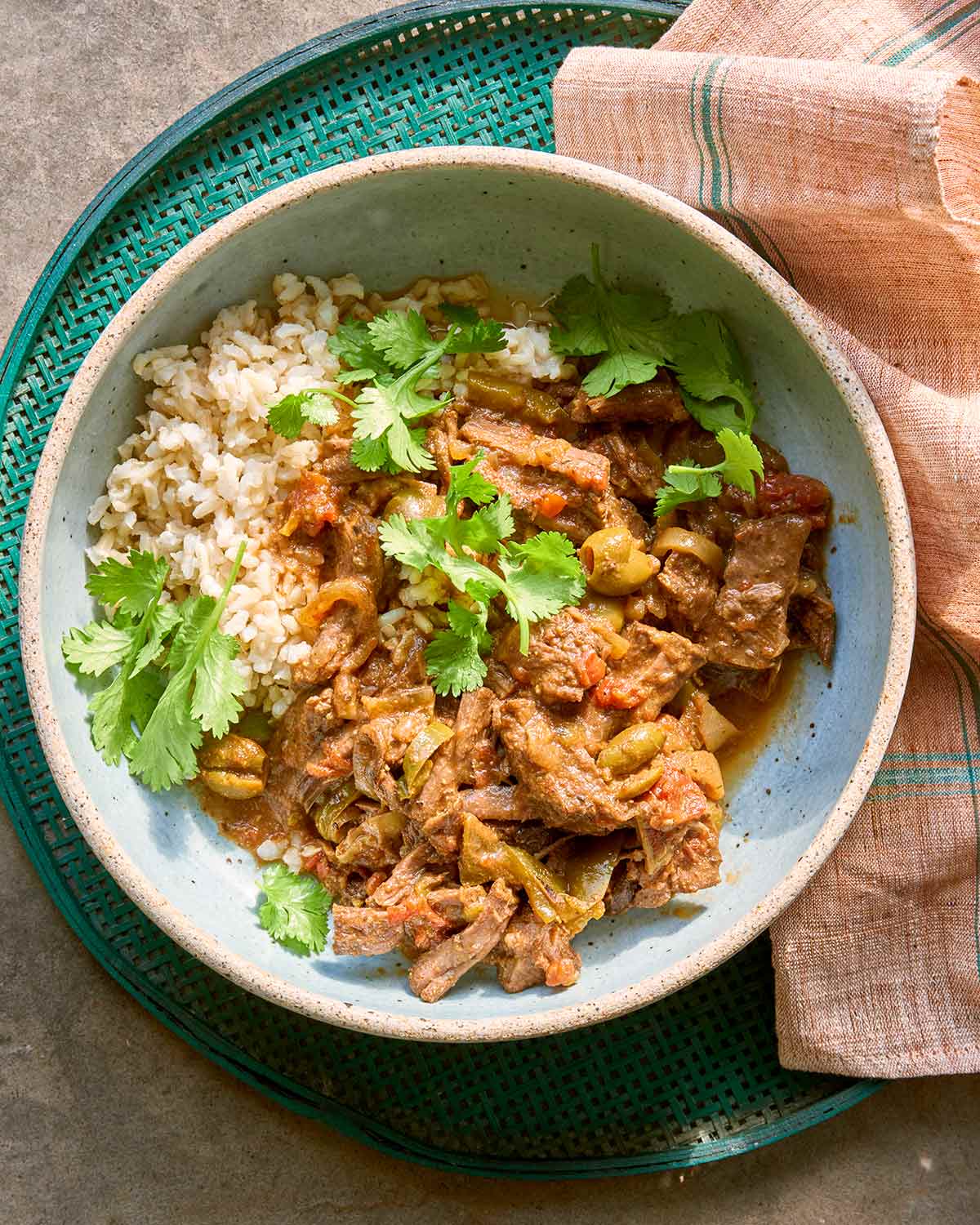
In my early twenties, I ended up living in a studio apartment in the same building that I grew up in. It was a surreal experience, almost a time loop, and living there allowed me to reconnect to some of the places I went to as a little kid. One of those places was La Taza del Oro, down the block on Eighth Avenue, a very special lunch counter that opened in 1947 and sadly closed in 2015. Along with Casa Adela in the East Village, La Taza del Oro was one of New York’s iconic Puerto Rican restaurants and it served dishes from other cultures too, including traditional Cuban ropa vieja (which translates to “old clothes,” an evocative description of the texture of the shredded beef).
I make this version at home regularly, and while it doesn’t bring back a restaurant I wish was still thriving, it helps me keep my memories of it alive. It’s also just so satisfying and soul-warming (which is why I made it a few times for our local volunteer EMT squad when Covid-19 hit our area).
Enjoy it on its own with rice or sweet, starchy things like roasted squash, fried plantains, or grilled corn. You could also use this beef for tacos or inside of a pressed sandwich (try it on your next grilled cheese).–Julia Turshen
Want to Save This?
What is Ropa Vieja?
First, it’s the national dish of Cuba and loved throughout the Latin Caribbean, so you know it’s going to be captivatingly good. A long, slow braise tenderizes the relatively tough, inexpensive cut of meat and infuses it with a tangy, spicy sweetness. This version isn’t the classic Cuban version, which uses flank steak—the long, ropy fibers are how it earned its name—and slightly different ingredients, but this Puerto Rican inspiration is still stellar and relies on the even less expensive chuck roast.
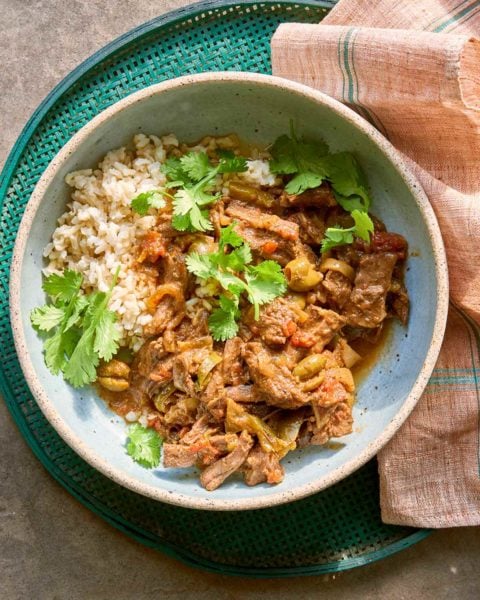
Puerto Rican-Style Ropa Vieja
Ingredients
- 1 large (9 oz) yellow onion, thinly sliced into half-moons
- 6 garlic cloves, peeled and crushed
- 2 medium (13 oz) green bell peppers, stemmed, seeded, and thinly sliced
- One (14 1/2-ounce) can diced tomatoes with their juice
- 1/4 cup yellow mustard
- 1/3 cup raisins, preferably golden
- 1/2 cup pimento-stuffed green olives, cut in half if large, plus 3 tablespoons olive brine for finishing the dish
- One (2- to 3-pound) boneless chuck roast, trimmed of any large pieces of fat or gristle, cut into 3 even pieces
- 2 teaspoons kosher salt, plus more for seasoning
- 1 teaspoon freshly ground black pepper
- 2 teaspoons ground cumin
- Cilantro, for serving (optional)
Instructions
- Preheat the oven to 300ºF (150ºC).
- In a large, heavy, ovenproof pot, such as a Dutch oven, stir together the onion, garlic, bell peppers, diced tomatoes with their juice, mustard, raisins, and olives (hang onto that liquid from the olies for later).
- Sprinkle the chuck roast all over with the salt, pepper, and cumin. Nestle the pieces into the mixture in the pot. Cover the pot tightly with a lid or aluminum foil.
- Roast the beef until it’s incredibly tender and shreds easily when you poke at it with tongs or a couple of forks, 3 to 3 1/2 hours.
- Add the olive liquid to the pot and use those tongs or forks to shred the beef directly in the pot (discard any large pieces of fat as you work).
- Stir the beef and juices together to combine. Taste and, if desired, add more salt. Serve warm with cilantro, if desired. (It’s honestly better the longer it sits. You can refrigerate it for up to a week and warm it up in a saucepan over low heat, splashing in a little water or stock if it needs some moisture. You can also freeze it for up to 3 months.)
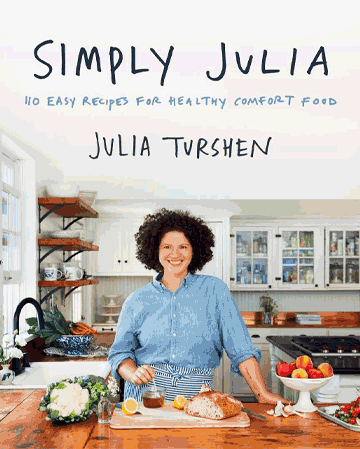
Explore More with AI
Nutrition
Nutrition information is automatically calculated, so should only be used as an approximation.
Recipe Testers’ Reviews
Beef and peppers are great together, stir-fried or braised like this wonderful ropa vieja. Preparing a braise is typically easy but this one was particularly fast since the meat didn’t have to be browned. Skipping this step made me wonder if the sauce would be somewhat bland, but it turned out to be an unnecessary concern.
The mustard, tomatoes, and garlic were great additions to make the sauce flavorful, and I loved the sharpness of the olive brine. Another thing that makes this recipe simple is that the liquid doesn’t have to be reduced afterwards. The beef is shredded right in the Dutch oven and it is ready to be served. Jasmine rice made the dinner table—a great accompaniment for ropa vieja.
This is the dish that you start on a Sunday afternoon and put in the oven while you go out for a walk or go about your day. Enjoy it for dinner that night and then graze on it all week long. There is so much flavor from such little effort and truly humble ingredients.
I can’t stop eating this in tacos, with beans and avocado, but there are so many possibilities. Would be lovely tucked into a breakfast scramble or even stuffed into a baked potato.
Yum! A delicious, mostly hands-off recipe. I was a bit skeptical that the recipe didn’t call for any browning of the meat at the beginning, but I was very happy with the end result. It was great to toss everything in the Dutch oven, pop it in the oven for a few hours and unveil the simmering medley of the flavors to enjoy.
I definitely plan to make this again in the future. With the right timing, it’d make a great work-from-home, weekday dinner. The leftovers hold up great, too. This recipe was very close to being a 10 for me. The next time I make it I plan to use 1 green bell pepper instead of 2, slice the olives in half, and cook it for 4 hours total.
I love a slow-cooked recipe that uses the oven instead of a slow cooker. I’ve made ropa vieja before but it has been years. This one was a breeze to prepare—a few minutes chopping and assembling, then pile everything in the Dutch oven and slowly cook over three hours. Mine did have the full 3 hours in the oven.
It shredded easily with a fork and a pair of tongs. It’s delicious and tastes just as great when reheated. Nice to have plenty of leftovers for the week ahead.
There’s something so comforting about tucking into a bowl of this. It isn’t showy or pretentious and doesn’t call attention to itself. It’s effectively a “dump dinner”, where you put a bunch of things into a pot (no searing required), mix them together, and then braise for 3 hours.
The ingredients, in their raw form, would certainly get people to question your sanity seeing fluorescent yellow mustard coating bell peppers and raisins, a combination almost never seen in the wild, but some magic really happens in that oven, and everyone at my table had full second helpings so we could keep exploring the varied tastes and textures.
The raisins soak up the beef juices and, while providing a nice background flavor, don’t endanger the meal’s savory status. The headnotes make sure to proclaim this recipe’s inauthentic origins, I can’t wait to seek out more ropa vieja variants and explore Cuban cuisine beyond what I can get as takeout from Porto’s. Everyone who ate it wants the recipe.
I instantly felt a connection to this recipe because I used to go to La Taza del Oro during my earlier days living in NYC when I was craving a taste of home. (I don’t have a Cuban background, but one of my parents’ favorite hole-in-the-walls growing up was a small Cuban diner in the heart of Long Island that served tremendous ropa vieja.) It’s been a long while since I’ve both had good Cuban food and seen my folks, so I figured savoring a taste of my past would satisfy both desires.
This is the sort of low, slow dinner that’s perfect to make on a lazy Sunday. There’s not much work involved in preparing it—the most you have to do is slice the onions and peppers, crack enough black pepper to coat the chuck roast, and be patient as the aromas overtake your kitchen.
While some of the flavor elements got lost in the mix (particularly the cumin), all was forgiven the moment you bit into the roast which is, no joke, some of the most flavorful meat I’ve made in a while. The pops of sweetness from the raisins cut through the brininess and acidic stronghold, but it could’ve become overwhelming if I didn’t cook rice to accompany it. That said, it tasted exactly like home to me.
UPDATE: The recipe was completely right; the flavors become even better over time. I ate my leftovers atop a whole roasted sweet potato, and the natural sweetness pairs perfectly with the briny, acidic, rich meat.
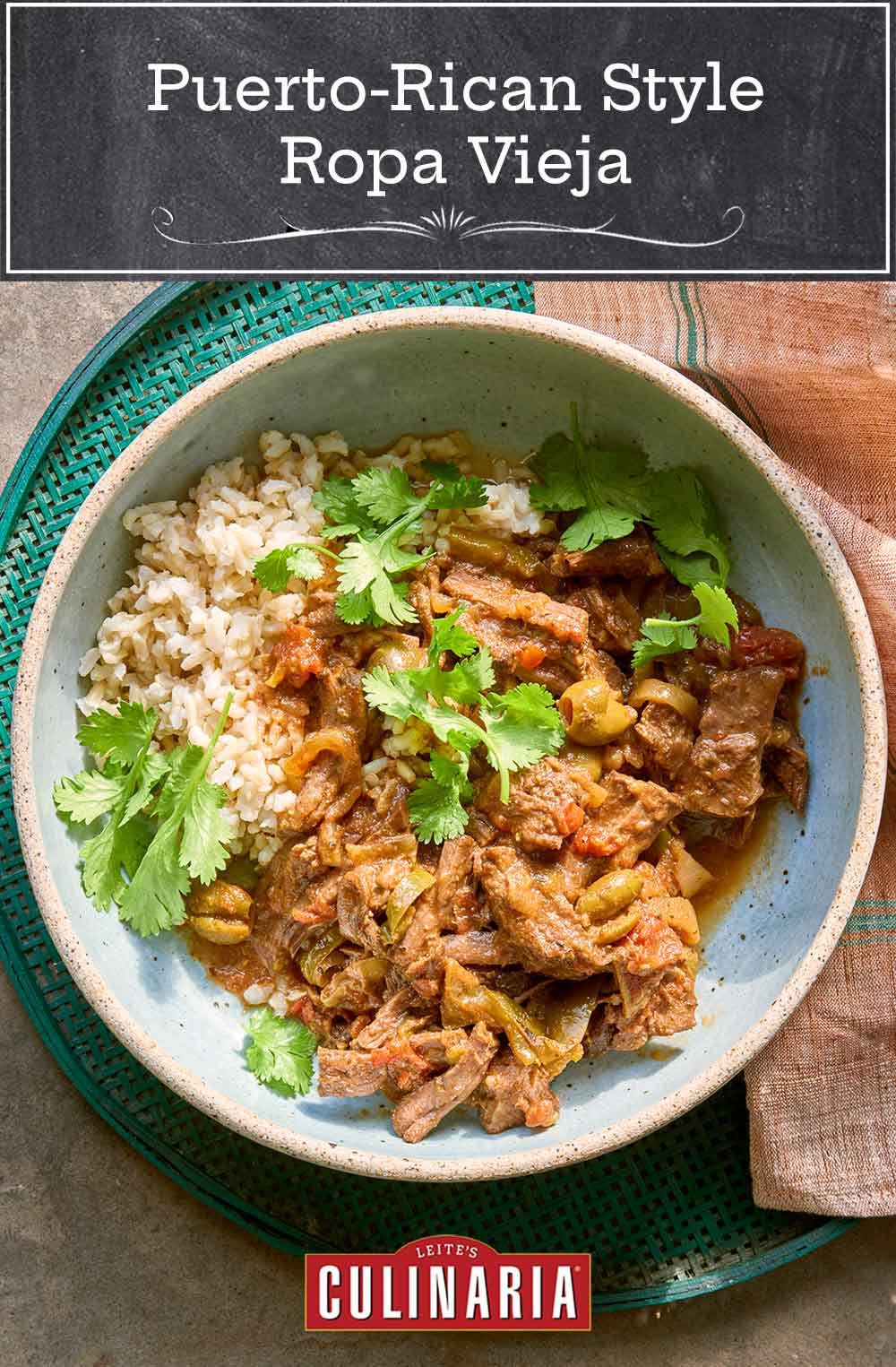
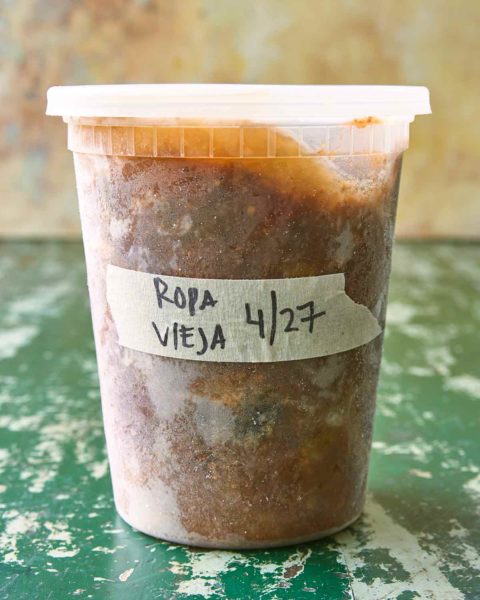













Puerto Rican Ropa Vieja never has raisins; that is a Cuban thing that we would never do in Rio Piedras.
Felipe, thank you for that. I really appreciate it.
Okay so THAT’s good. I had the meat thawed and exactly enough time and all the ingredients — or so I thought. Red pepper very pretty if lacking the bitterness that’s coveted in green peppers. Chutney would be a good substitute for the golden raisins that refused to be found but Best By Date of 2013 (oops) and smelled funky. Dried currants Best By 2020 something and a tad odd looking so if you never hear from me again, blame the currants. BUT! Just pulled it out of the oven and it’s excellent … despite a power outage midway and the oven not coming back on … oops again unbeknownst to me. Sweet potatoes finishing in the microwave now. THANK YOU for your frequent inspiration and trusted recipes.
So glad this worked out for you, Alanna, despite all the setbacks! Can’t wait to hear what you make next.